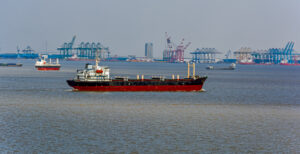The latest report of Petrofin Research shows that the number of Greek shipping companies went down to 592 in 2023 from 599 in 2022.
In terms of the size of the companies, the number of 25+ vessel companies rose to 57 from 56 in 2022, and 54 in 2021, marking the highest number ever.
Tonnage wise they are up by 7.86m tons DWT in 2023 compared to a rise of 18.17m tons DWT in 2022.
Over 1m ton owners rebounced to growth with 83 companies compared to a loss of 4 companies that brought the group down to 78 companies in 2022. Their percentage of the fleet is up to 79.3%, back to 2021 levels after a reduction to 78.3% in 2022. The 80% share of the ton millionaires continues to represent a significant barrier.
The number of companies running very young fleets (0-9 years of age) continues its downward trend, this time down to 89, from 99 in 2022. This reflects the scepticism belying the ordering of newbuildings which results in the rise of the average fleet age.
The rise in age of the whole fleet that began in 2018 continues. For 2023 it averaged 14.3 years, slightly up from 2022 (14.1 years).
There is an apparent slowdown in the growth of the Greek fleet. This can be explained by a slowdown of newbuilding deliveries and S&P activity as well as scarce disposal of older vessels.
As far as the number of Greek shipping companies in terms of fleet size during the period 2003-2023, the Petrofin Research shows that the decline in 1-2 vessel companies continues.
It is noteworthy that 16-24 vessel companies went up to 40 for the first time and together with the 25+ vessel companies show a trend for bigger fleets.
The other groups were fairly stable. It is worth mentioning that in this analysis Greek companies are divided into the fleet size groups: 25+ vessels fleets, 16-24 vessels fleets, 9-15 vessels fleets, 5-8 vessels fleets, 3-4 vessels fleets, 1-2 vessels fleets.
Regarding the top Greek fleets, DWT volumes have risen in 2023 and percentages of market share have remained largely the same.
The Dry bulk sector continues to be the backbone of the Greek fleet holding nearly 50% share. “This renders decisions for ordering alternatively fuelled vessels more precarious. It has shown growth in number of companies, number of vessels and tonnage,” the research says.
In the last 10 years the Container sector has more than doubled in DWT terms and number of vessels. This sector saw the average age reducing from 14.02 to 13.38 years in 2023. Additionally, 28 containers were added resulting in an increase of 6.23% in DWT terms.
As far as the Greek LNG fleet, this sector marked a significant increase in 2023 by 14.6% in DWT terms and the addition of 20 vessels. The market of LNG is seeing a marked rise globally.
“As the number of companies operating in this sector are relatively constant and the DWT is rising fast, it shows that companies’ LNG fleets are growing larger at a fast pace. The relatively young age of the fleet reflects the considerable number of newbuilding that have entered this sector over the last decade,” it is noted in the research.
For the second year running the number of Greek shipping companies fell by 7.
Traditionally, the backbone of Greek shipping has been the small owners. “Although the number for the very small owners (1-2 vessels) has indeed gone down, we must observe the increase of the order of 8.41% in their fleet DWT,” Petrofin Research reports. At the other end of the scale, the 25+ vessel fleets remain fairly stable in their number and show a 2.5% increase in DWT terms.
Overall, in 2023 the fleet exhibits again the dynamism that is associated with it.
It is noteworthy that in the top tier of owners (Top 30, Top 50 and Top 70) the market share remains almost the same over the last few years.
The Greek fleet is continuing to grow and is expected to accelerate as the number of newbuilding orders have increased lately using conventional but eco Tier III technology.
“As the orders have been placed by large companies and the price of second hand vessels has risen substantially, we anticipate a further reduction in the number and importance of the smaller size companies,” the Petrofin Research adds.
Source: Petrofin Research by Head Ted Petropoulos.



